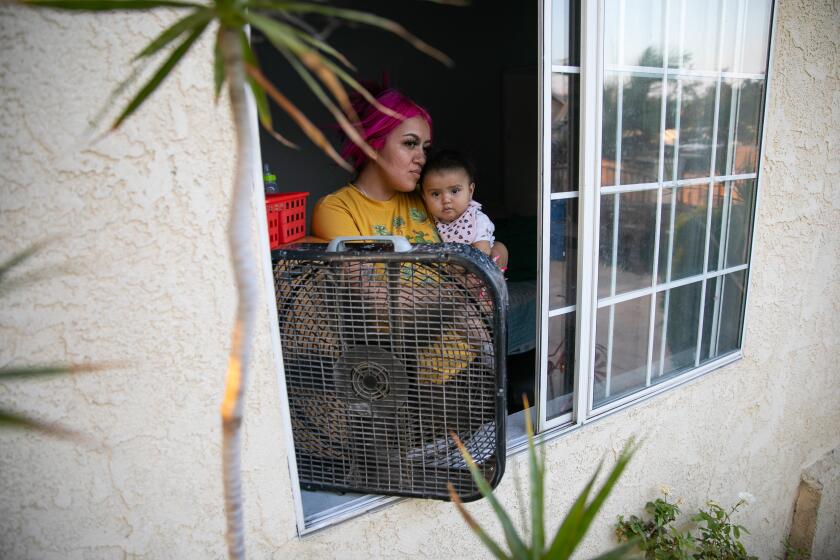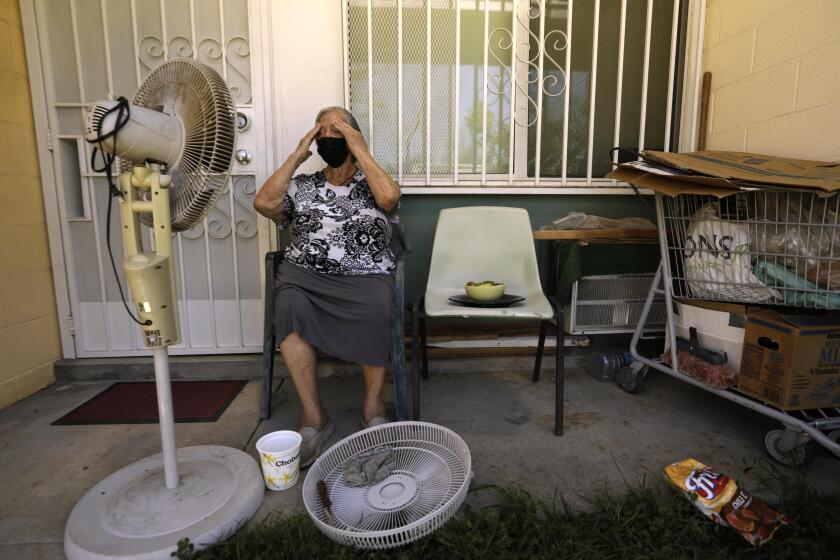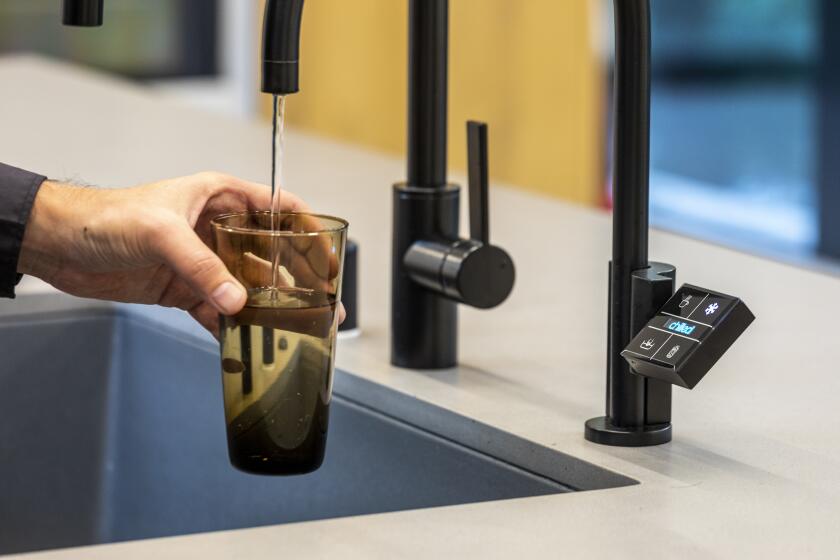Low-income LADWP customers’ bills are about to rise. What help is available?

- Share via
As Angelenos wither under another hot summer, the Los Angeles Department of Water and Power is shrinking a discount program that helped low-income families pay their bills.
The utility has no choice; the subsidies that funded the DWP’s discounted water rates were declared illegal by a Superior Court judge in May. That discount will disappear Thursday, although others will remain in place, the DWP said in a letter to customers.
For the record:
11:08 a.m. July 19, 2023An earlier version of this article incorrectly reported that the DWP was appealing the court’s ruling.
In addition, there are a few alternative sources of aid that could mitigate the loss of the water discount.
Here’s what you need to know about the coming change to your bill.
The Los Angeles Department of Water and Power has relaunched a rebate program for energy-efficient air conditioners to help lower-income Angelenos stay cool.
What was the lawsuit about?
Los Angeles residents Stephen and Melinda Dreher sued the LADWP in 2019, contending that its water rates violated the California Constitution. In particular, they challenged the tiered pricing system that charges heavy users more per gallon than light users — an approach that’s designed to promote conservation in the face of dwindling supply.
Under Proposition 218, an initiative passed in 1996 to limit local agencies’ power to tax, water rates must be tied to the cost of delivering the service. Otherwise, the rates are taxes that have to be put to a public vote. And the DWP’s rates were adopted by the utility, not the voters.
Superior Court Judge Mary H. Strobel upheld the DWP’s tiered pricing but ruled against the utility’s Low-Income Subsidy Adjustment, a surcharge on most water charges that pays for the lower water rates offered to low-income customers. According to Strobel, the surcharge was not proportional to the cost of delivering water, therefore it violated Proposition 218.
The Drehers also asked the LADWP to repay all the money collected from the surcharge. Strobel denied that request.
Parts of Southern California could experience triple-digit temperatures in this heat wave. Here are some tips to beat the heat without air conditioning.
Who will be affected?
The DWP says it is ending the water discounts within two programs aimed at lower-income customers: EZ-SAVE, which is for low-income households in general, and Lifeline, which is a potentially larger discount for elderly customers and those with disabilities whose household income in 2022 was less than $50,450.
All told, that’s roughly a quarter-million Angeleno households.
The discounts have been $5 to $10 per month for EZ-SAVE customers, with the amounts pegged to the number of people in the household. Lifeline customers have received $10 off each month. In both programs, the discount could not be larger than the customer’s water bill.
Those discounts will vanish after Wednesday. But the EZ-SAVE and Lifeline discounts for electricity and sewer service will continue — the ruling affects just the funding behind the water discounts.
At the same time, the water costs for DWP customers not enrolled in those programs will drop slightly. The Low Income Subsidy Adjustment amounted to about 10 cents per 100 cubic feet of water used. According to a DWP spokesperson, that translated to a median surcharge of $1 a month.
A recent report found that Black, Latino and low-income households in L.A. bear the brunt of utility shutoffs. Here’s what to do if you lose water, electricity or gas service.
Are there other sources of help?
The are several alternatives, but none of them offer discounted rates like EZ-SAVE and Lifeline did.
One is the Low Income Household Water Assistance Program (LIHWAP), which offers a one-time grant to pay a current bill of up to $316 or built-up debt of up to $15,000. The aid is available only through Aug. 31, and only to households that meet the monthly income limits (consult this chart online). For a single person, it’s no more than $2,700 per month. For a family of four, it’s $5,193.
You can receive the program’s help only once. But it’s tax-free and does not affect your eligibility for any other aid programs, the DWP says. Nor would it be considered evidence by U.S. Citizenship and Immigration Services that you are a public charge, according to the DWP.
The LIHWAP is federally funded but administered by local service providers. A group of those providers will be holding an L.A. Water Assistance Event on Friday at the Los Angeles Convention Center from 10 a.m. to 6 p.m. to help people apply for grants.
You can schedule an appointment online or just walk in. The event is free, but parking is not. (Metro could be a good alternative to driving; there’s a rail stop near the Convention Center.)
If you do attend, the organizers advise you to bring a current government-issued ID; a document that shows your Social Security Number; your current water, wastewater or stormwater bill (or, if your water bill is included in your rent, your landlord agreement); and proof of your monthly housing cost (mortgage or rent). You’ll also need to prove that you meet the income limits, either by showing that you’re eligible for CalFRESH, CalWORKS or the Low Income Home Energy Assistance Program, or by documenting the income for all adults in your household for the previous four weeks.
The DWP also points to two programs that help customers manage their bills even though they don’t provide discounts:
- Level Pay spreads your utility bills out so you pay roughly the same amount every month. That cuts your bill in the months when you use the most services (typically in the summer) and raises it in the months when you use the least (typically in the winter).
- Extended Payment Arrangements give EZ-SAVE and Lifeline customers up to 48 months to pay their overdue balances with no interest charges or fees.
To enroll in either program, call (800) 342-5397 or, for TDD service, (800) 432-7397.
About The Times Utility Journalism Team
This article is from The Times’ Utility Journalism Team. Our mission is to be essential to the lives of Southern Californians by publishing information that solves problems, answers questions and helps with decision making. We serve audiences in and around Los Angeles — including current Times subscribers and diverse communities that haven’t historically had their needs met by our coverage.
How can we be useful to you and your community? Email utility (at) latimes.com or one of our journalists: Jon Healey, Ada Tseng, Jessica Roy and Karen Garcia.
More to Read
Sign up for Essential California
The most important California stories and recommendations in your inbox every morning.
You may occasionally receive promotional content from the Los Angeles Times.

















